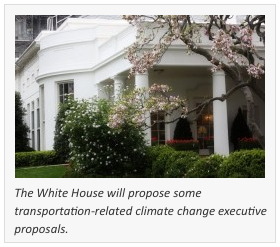Today President Obama is proposing a couple of transportation-related executive actions to reduce emissions and global warming. It’s part of a larger package of actions on climate change for which the President can sidestep Congressional approval.
 The Washington Post has a good, long analysis of the new White House approach and proposal: “Obama tries the kitchen-sink approach to global warming.” And here’s a different take, from the Washington Times: “Obama to push unilateral action against climate change.”
The Washington Post has a good, long analysis of the new White House approach and proposal: “Obama tries the kitchen-sink approach to global warming.” And here’s a different take, from the Washington Times: “Obama to push unilateral action against climate change.”
Here’s the text from the White House’s 21-page summary of actions. Also sprinkled throughout the document are references to strengthening the resiliency of transportation infrastructure that is vulnerable to climate events.
“II. Building a 21st-Century Transportation Sector
Increasing Fuel Economy Standards: Heavy-duty vehicles are currently the second largest source of greenhouse gas emissions within the transportation sector. In 2011, the Obama Administration finalized the first-ever fuel economy standards for Model Year 2014-2018 for heavy-duty trucks, buses, and vans. These standards will reduce greenhouse gas emissions by approximately 270 million metric tons and save 530 million barrels of oil. During the President’s second term, the Administration will once again partner with industry leaders and other key stakeholders to develop post-2018 fuel economy standards for heavy-duty vehicles to further reduce fuel consumption through the application of advanced cost-effective technologies and continue efforts to improve the efficiency of moving goods across the United States.
The Obama Administration has already established the toughest fuel economy standards for passenger vehicles in U.S. history. These standards require an average performance equivalent of 54.5 miles per gallon by 2025, which will save the average driver more than $8,000 in fuel costs over the lifetime of the vehicle and eliminate six billion metric tons of carbon pollution – more than the United States emits in an entire year.
Developing and Deploying Advanced Transportation Technologies: Biofuels have an important role to play in increasing our energy security, fostering rural economic development, and reducing greenhouse gas emissions from the transportation sector. That is why the Administration supports the Renewable Fuels Standard, and is investing in research and development to help bring next-generation biofuels on line. For example, the United States Navy and Departments of Energy and Agriculture are working with the private sector to accelerate the development of cost-competitive advanced biofuels for use by the military and commercial sectors. More broadly, the Administration will continue to leverage partnerships between the private and public sectors to deploy cleaner fuels, including advanced batteries and fuel cell technologies, in every transportation mode. The Department of Energy’s eGallon informs drivers about electric car operating costs in their state – the national average is only $1.14 per gallon of gasoline equivalent, showing the promise for consumer pocketbooks of electric-powered vehicles. In addition, in the coming months, the Department of Transportation will work with other agencies to further explore strategies for integrating alternative fuel vessels into the U.S. flag fleet. Further, the Administration will continue to work with states, cities and towns through the Department of Transportation, the Department of Housing and Urban Development, and the Environmental Protection Agency to improve transportation options, and lower transportation costs while protecting the environment in communities nationwide.”
…
Larry Ehl is the founder and publisher of Transportation Issues Daily. In the public sector, Larry was Federal Relations Manager for Washington State DOT; Chief of Staff to US Senator Slade Gorton; and was twice elected to the Edmonds School Board.
Tags: Biofuels, Buses, Climate Change, Energy, heavy-duty trucks, Obama, transportation, Transportation Issues Daily, vans






 RSS Feed
RSS Feed